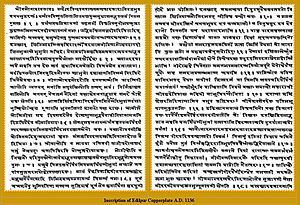Sena dynasty facts for kids
Quick facts for kids
Sena Empire
সেন সাম্রাজ্য
Shen Shamrajjo |
|||||||||
|---|---|---|---|---|---|---|---|---|---|
| CE 1070–CE 1230 | |||||||||
| Capital | Gauda, Bikrampur, Nabadwip | ||||||||
| Common languages | Sanskrit | ||||||||
| Religion | Hinduism (Vedic Hinduism, Shaivism, Tantra and Vaishnavism) | ||||||||
| Government | Monarchy | ||||||||
| King | |||||||||
|
• 1070–1095 AD
|
Samanta Sena]] | ||||||||
|
• 1095–1096 AD
|
Hemanta Sena | ||||||||
|
• 1096–1159 AD
|
Vijaya Sena | ||||||||
| Historical era | Classical India | ||||||||
|
• Established
|
CE 1070 | ||||||||
|
• Disestablished
|
CE 1230 | ||||||||
|
|||||||||
The Sena Empire was a powerful Hindu kingdom in Bengal, a region in the eastern part of the Indian subcontinent. It ruled during the 11th and 12th centuries. At its strongest, the empire covered a large area in northeastern India. The rulers of the Sena Dynasty originally came from a southern Indian region called Karnataka.
The Sena Empire: A Brief History
The Sena Empire began around 1070 AD. It was founded by a person named Samanta Sena. This empire was important because it brought a period of stability and growth to Bengal.
Key Rulers of the Sena Dynasty
The Sena dynasty had several important rulers who helped shape the empire.
Samanta Sena: The Founder
Samanta Sena was the first ruler and founder of the Sena dynasty. He laid the groundwork for the future empire.
Hemanta Sena: Taking the Throne
After Samanta Sena, Hemanta Sena took control in 1095 AD. He declared himself king, which means he took power and became the official ruler.
Vijaya Sena: A Long and Strong Reign
Vijaya Sena ruled for a very long time, from 1096 AD to 1159 AD. This was over 60 years! He was crucial in building the empire's strength and making it stable.
Ballala Sena: Expanding the Empire
Ballala Sena was another important king. He conquered Gaur, which was a major city. He also became the ruler of the Bengal Delta, a fertile area where a river meets the sea. Ballala Sena made Nabadwip one of the capital cities. He married Princess Ramadevi from the Western Chalukya Empire in South India. This shows that the Sena rulers kept good connections with people from other parts of India.
Lakshmana Sena: The Empire's Peak
Lakshmana Sena became king in 1179 AD and ruled Bengal for about 20 years. During his time, the Sena Empire grew even bigger. It expanded into areas like Assam, Odisha, and Bihar. It might have even reached Varanasi.
The End of the Sena Empire
The Sena Empire faced challenges in the early 13th century.
The Attack by Bakhtiyar Khalji
In 1203–1204 AD, a general named Bakhtiyar Khalji attacked Nabadwip. Khalji was a Turkic general. He defeated King Lakshmana Sena. This led to Khalji taking control of northwest Bengal. However, the eastern part of Bengal remained under Sena control for some more time. The empire slowly declined after this major defeat.
Images for kids
See also
 In Spanish: Dinastía Sena para niños
In Spanish: Dinastía Sena para niños
 | William M. Jackson |
 | Juan E. Gilbert |
 | Neil deGrasse Tyson |




